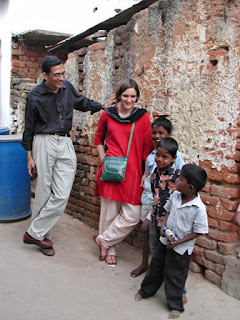Governments, charitable organisations, NGOs and International agencies are investing billions of dollars to alleviate poverty but much of the work is based on assumptions about the poor and the world that are untested generalizations. Anti-poverty efforts are littered with uplifting anecdotes and intellectually argued policies and recommendations for instant miracles - but they rarely have much space for all average poor men or women, with their hopes and doubts, limitations and aspirations, beliefs and confusions. All too often the economics of poverty gets mistaken for the economics of poor. And because the poor possesses very little, it is assumed that there is nothing interesting about their economic existence.
In their recently published and widely acclaimed book, Poor Economics: A Radical Rethinking of the Way to Fight Global Poverty, MIT professors Abhijit V Banerjee and Esther Duflo have radically challenged this stereotype; and argued for avoiding many of these flawed clichés – to really understand the lives of poor with all their complexity and richness.
Poor Economics is a book about the very rich economics that emerges from understanding the economic lives of the poor. With the evidence emanating from the pioneering work in development economics at their award-winning Poverty Action Lab; and with their fifteen years of fieldwork in India and across the world, Banerjee and Duflo argue that by using randomized control trials, and more importantly, by paying careful attention to the evidences emanating from these trials, it is possible to sift nuggets of truth from the slurry of received wisdom and wishful thinking; and make accurate—and often startling assessments on what really impacts the poor and what doesn’t.
And these in turn help develop the kind of theories that help us make sense of both what the poor are able to achieve, and for what reason they need a push.
Poverty is often linked in the public mind with dependency. But, as the authors point out, the poor bear more responsibility for their lives than the rich, who coast along, enjoying chlorinated water, drawing a regular salary, paid directly into a bank account, perhaps with contributions to their pension and health care automatically deducted. In contrast, the poor mostly do not have a regular income, and have to make careful economic choices with limited access to information, to survive on $0.99 or less. And it implies a very high level of resilience, willpower and survival skills in securing their family’s today and tomorrow. On the other hand, tiny mistakes and seemingly minor barriers can be devastating in their lives.
Drawing on the research at the Poverty Action Lab, Banerjee and Duflo have raised many pertinent questions in the book: what do governments do for the poor to improve their lives, and when do they fail them? How markets and institutions work for the poor? Are there ways for the poor to improve their lives, and what is preventing them from being able to do these things? The two economists therefore recommend an informed array of nudges and props that will make it as easy for poor people to make the right decisions, and accompanying huge differences in their lives.
If it is a mistake to equate poverty and dependency, it is equally mistaken to believe the poor will lift themselves up by their bootstraps. The book crosses swords with the business gurus and philanthropists who project their own enthusiasm for Promethean entrepreneurship onto the poor. Yes, the poor are more likely to run their own business than the rest of us. But that is because they have no other choice. When asked, most of them aspire to a government post or a factory job.
But the true value of Poor Economics lies in the wealth of knowledge and opportunities that answer to the small challenges thrown up. De-worming children, dropping chlorine into the village well, mid-day meals in schools, micro-credit and micro-insurance, improved local government, each provides a "billion client opportunity" and this list goes on.
Poor Economics is ultimately about how to fight global poverty; and helps us to understand why so many magic bullets of yesterday have ended up as today’s failed ideas. The book is also optimistic enough to argue that things can be improved at the margin; development community must keep on trying even in the face of overwhelming challenges.
Source: GKC


No comments:
Post a Comment